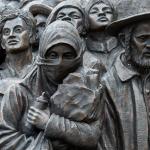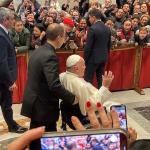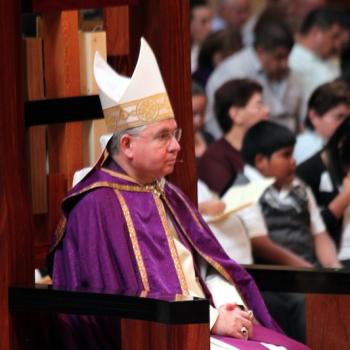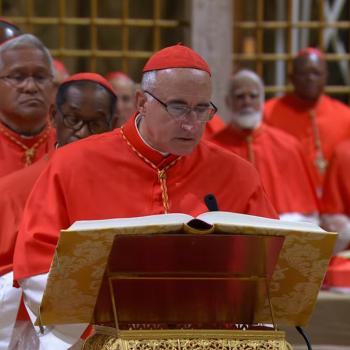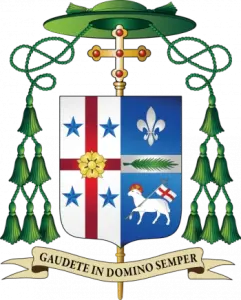 Bishop Stephen D. Parkes, Bishop of Savannah, issued the statement below in regards to immigration issues which affect the Catholic Church in the United States. The first, is the uncertainty of many Catholic faithful who are in the United States without proper authorization, the second, is the significant delays in the immigration process for clergy to remain in the United States once their Religious Worker Visa expires. This second concern is causing many dioceses throughout the country to loose priests who have been ministering faithfully in our parishes. Pretty much every diocese is affected. I agree wholeheartedly with the Bishop’s words, and his concern for all the faithful under his care. Here is the statement:
Bishop Stephen D. Parkes, Bishop of Savannah, issued the statement below in regards to immigration issues which affect the Catholic Church in the United States. The first, is the uncertainty of many Catholic faithful who are in the United States without proper authorization, the second, is the significant delays in the immigration process for clergy to remain in the United States once their Religious Worker Visa expires. This second concern is causing many dioceses throughout the country to loose priests who have been ministering faithfully in our parishes. Pretty much every diocese is affected. I agree wholeheartedly with the Bishop’s words, and his concern for all the faithful under his care. Here is the statement:
Statement from Bishop Stephen D. Parkes Regarding Immigration Concerns
As immigration is under much discussion and review in our country, I share with you a summary of the three basic principles of Catholic social teaching regarding this topic from the United States Conference of Catholic Bishops (“Catholic Social Teaching on Immigration and the Movement of Peoples”):
- People have the right to migrate to sustain their lives and the lives of their families.
- A country has the right to regulate its borders and control immigration.
- A country must regulate its borders with justice and mercy.
In a special way today, I bring the following contemporary concerns to your attention and ask for your reflection and prayers:
- Many who are living in our ninety-county Diocese of Savannah have come from other countries. Some may be here without proper documentation and have been here for years. Seeking a better life and opportunities for their children and future generations, they have made their homes here: raising families, attending schools, and working in our local areas. Many of the immigrants who have come to south Georgia are faithful: supportive of our parishes and missions, seeking to answer God’s call to discipleship, and living good moral values. For many years, the immigration system for those seeking to make a home in the United States has been plagued by complicated paperwork, expense, and bureaucracy. While this has, sadly, become a divisive political issue, let us not forget that it has a human face blessed with God-given dignity. As we look to the future, I hope that in utilizing the gifts of the Holy Spirit our government leaders will work together to develop solutions for our broken system while respecting the tenets of our faith and the vision and values upon which our country has been founded, sustained, and expanded. I ask that we pray for those who are suffering extreme anxiety about their future and the future of their families. May we have the grace to accompany our brothers and sisters in Christ as witnesses of faith and hope.
- Our Diocese of Savannah is considered a “mission” diocese, relying on the assistance of Priests from other countries to serve the spiritual needs of our local Church. In April 2023, a backlog developed for those applying for renewal of Religious Worker Visas. This backlog has resulted in a delay of approved renewals of the visas for some Priests serving in our diocese, as well as (arch)dioceses across the United States. In working with legal counsel, all reasonable possibilities have been explored and exhausted. I have worked closely with the Bishops of the home dioceses of those Priests affected and am grateful for their advice and direction. However, the Priests affected may need to return to their home country for a period of time. I ask for your prayers for them and for your patience and support as we provide for the spiritual needs of all in our mission diocese.
In just a few days we will celebrate the Birth of our Saviour. Let us recall the journey of the Holy Family into Egypt, when Joseph, Mary, and the infant Jesus fled to another land – immigrants in search of a life of peace and hope. With their plight in mind, I share with you the words of Pope Francis from his Christmas Eve homily in 2017, “Christmas is a time for turning the power of fear into the power of charity, into power for a new imagination of charity. The charity that does not grow accustomed to injustice, as if it were something natural, but that has the courage, amid tensions and conflicts, to make itself a ‘house of bread,’ a land of hospitality.”
May we meet each day in our prayers as disciples who journey together free of fear, rich in charity, committed to hospitality, and strong in hope.


